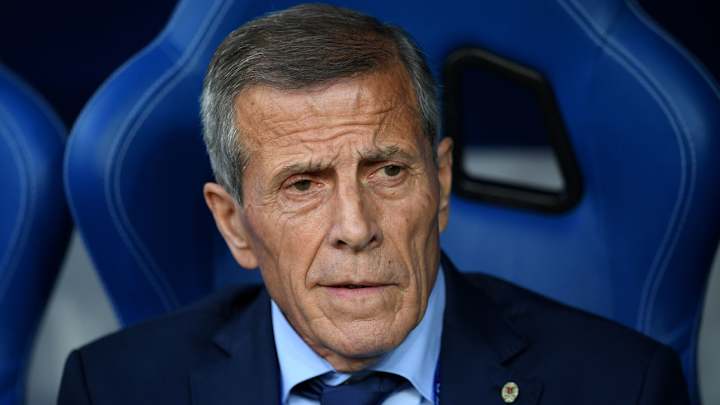Manager Oscar Tabarez Wields His Influence to Mold, Adapt, Embody Uruguay

Oscar Washington Tabarez is fascinated by history. Barely a press conference goes by in which he doesn’t, in one of his typically thoughtful answers, illustrate a point with an example from a previous World Cup. You wonder how that plays in the dressing room, in the modern world of celebrity footballers who, by reputation at least, care for nothing but their next fancy car or watch. But then you see Luis Suarez sitting next to him, gazing at his manager with rapt attention. If there were any doubt before that Tabarez is the greatest figure in post-War Uruguayan football history, it has surely gone now.
It is not just that he has taken Uruguay to a Copa America title and to the semifinal of a World Cup, or that he will, on Friday, lead his side against France in another World Cup quarterfinal. It is that he has changed the focus of the game in his country, ensured that after he has gone there will be at least one more generation that plays his way.
That issue of mortality is a pressing one. Tabarez is 71 and has a “chronic neuropathy” that means he has to walk with the aid of a crutch. During the Copa America Centenario, even that wasn’t possible and he was driven about in a golf cart. The sight of him struggling to his feet to celebrate Edinson Cavani’s winner against Portugal in the round of 16 was desperately poignant. Yet there is no sense of his mental energies being diminished and players react with genuine horror at the prospect of a future without him. Their respect–their love–for him, is profound.
Oscar Tabarez is the foundation for everything #URU does on the field. @lmechegaray on the manager's methods and undeniable impact.
— SI Soccer (@si_soccer) July 4, 2018
For more from this week's Planet Fútbol TV, sign up for a FREE trial of SI TV here: https://t.co/a5skloCbmI pic.twitter.com/yzk3YweQo6
There is one detail from the past to which Tabarez returns again and again. It concerns the final game of the 1950 World Cup, when Uruguay beat a Brazil side that needed only a draw to claim the title in the Maracanã in Rio de Janeiro. Brazil assumed it would win. There were 200,000 fans there. The Uruguayan inside-right, Julio Perez, was so intimidated that he wet himself during the anthems. Brazil even took the lead. Yet Uruguay won 2-1. History regards it as the greatest smash-and-grab in history.
In the myth of the game, the decisive moment is supposed to have come when Uruguay’s captain Obdulio Varela punched Brazil left back Bigode and gained a psychological advantage. Both players insisted the incident was overplayed, but it gained particular traction in Uruguay where the defining feature of the national style is seen to be “la garra charrua.” That translates literally the claw of the Charrua people who inhabited the land when European colonists arrived, but more idiomatically, a streetwiseness, toughness and determination that has allowed Uruguay to win two World Cups (and two Olympics in the days when the Olympics effectively was the World Cup) despite a population of just 3.5 million.
World Cup Quarterfinal Power Rankings: Field Narrows to Powers, Surprises
Tabarez, though, interprets the game differently. Whenever the conversation drifts to the Maracanazo, as it is known, he asks how many fouls Uruguay committed. The answer is 11. As he points out, that is a remarkably low number of a game that was supposed to be a siege, with Uruguay relying on physical aggression to hold off Brazil. The wrong lesson, he believes, has been drawn: Uruguay prevailed not because its players kicked Brazil off the pitch, but because it played better football.
That’s not to say Tabarez is soft. On the wall of his house in Montevideo he has inscribed a line attributed to Che Guevara: “One must harden oneself without losing tenderness.” There are times when his sense of loyalty to his players sits awkwardly with his manifest integrity, as when he defended Suarez at the last World Cup after the forward had bitten Giorgio Chiellini. But the toughness now is focused. Uruguay, in four games at this World Cup, has conceded only one goal and collected only one yellow card. Tabarez has made defending clean again.
World Cup Quarterfinalists By the Numbers: Key Stat for Each Team
When he was first appointed to the national job, to lead Uruguay into the 1990 World Cup, he had a specific brief to restore the national reputation after 1986, when it had taken one point from three group games, gained a reputation for thuggishness and suffered the fastest red card ever in a World Cup game (Jose Batista, 56 seconds against Scotland). He just about achieved that, but it is after his return in 2006, taking control of the entire coaching infrastructure as well as the national team, that his influence has really begun to be felt.
The days of Egidio Arevalo Rio scuttling around midfield harrying anything that moved have gone. Lucas Torreiro perhaps invokes his Pacman image to an extent, but he is a far better ball-player, while the likes of Rodrigo Bentancur and Matias Vecino are different types of midfielder altogether. This is Tabarez’s doing, the result of his academy system. He has taken a country with a proud football heritage and has encouraged it to see itself in a different way, to remember again what made it great. He has shaped Uruguayan football to his will and made it better.
And that, whatever happens against France on Friday, is an achievement without parallel anywhere in the modern game.

An accomplished author of multiple books, Jonathan Wilson is one of the world’s preeminent minds on soccer tactics and history.